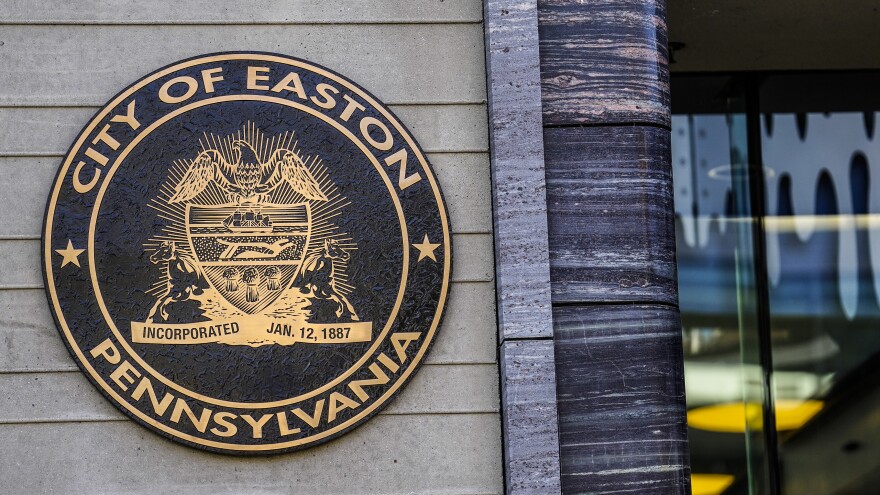EASTON, Pa. — Public support for a Welcoming City ordinance in Easton is on the rise again, with local residents calling for a measure to protect their fellow community members.
Residents backing such a measure went to Easton City Council’s Tuesday committee session and Wednesday meeting to voice support, with Councilwoman Taiba Sultana stating she intended to have the ordinance passed soon.
Sultana said she had a meeting with Easton Police Chief Carl Scalzo arranged for Friday, with the intent to review the language of her original proposal to ensure it stayed with the confines of the city’s code.
The councilwoman’s latest attempt to pass a Welcoming City ordinance comes months after Allentown and Bethlehem also explored the designation.
Allentown codified a pro-immigrant policy in early February.
A few weeks later, Bethlehem Mayor J. William Reynolds and Police Chief Michelle Kott said they believed a “welcoming ordinance” for the city was unnecessary, as practices to protect immigrants have been in place for years.
What a Welcoming City is, and isn’t
Sultana offered the council committee attendees a presentation on Welcoming Cities to clear up misconceptions.
According to her definition, one of the primary drivers of misinformation or misinterpretation stems from a confusion between Sanctuary Cities and Welcoming Cities.
A Sanctuary City limits cooperation with federal agencies to protect undocumented immigrants, does not honor detainer requests and provides a safe haven for immigrants.
A Welcoming City, however, is a proactive approach aimed at assisting all immigrants, regardless of legal status, focusing on immigration and community involvement.
“Easton must comply with federal, state laws, and court orders, and honor warrants signed by a federal judge.”Easton City Councilwoman Taiba Sultana
That leads to economic growth with more immigrants contributing to the local economy, enriching the local culture, and improving overall public safety, Sultana said.
Sultana made it clear that “Easton must comply with federal, state laws, and court orders, and honor warrants signed by a federal judge.”
She disputed that such a policy would make the city an ICE target. She pointed out that ICE has operated “around the clock, conducting operations in schools and workplaces, which means that we are already vulnerable.”
There is no evidence that ICE has conducted such operations in Easton.
Touching on threats of lawsuits related to the policy, Sultana pointed to the 2014 case in which Allentown and Lehigh County were held liable for detaining a U.S. citizen, leading to the individual in question “costing taxpayers over $125,000.”
She repeated that the ordinance would honor all laws, but clarified how the municipality would address federal immigration requests with local residents in mind.
Responding to concerns about the freezing of federal funds to Welcoming Cities, she emphasized there is no legal basis for such an action — though it remains to be seen if the federal government will honor its own rules.
And perhaps the key to the ordinance comes from the fact that while the city already welcomes immigrants, policies to protect them have not been enshrined in the code of law.
That means the next administration could simply let a resolution pass away.
Community pushes for compassion
During the Wednesday meeting, a few Eastonians spoke in support of a Welcoming City ordinance, and clarified a few points.
Just outside the Easton Community Center prior to Wednesday’s meeting, Dominic Trabosci handed out flyers that urged people to “Help our community be a safer place for our immigrant friends and families.”
The fliers listed contact information for council members and details on Sultana’s ordinance.
“The suggestion to pass a resolution standing in opposition of mass deportations is nice, but doesn't really do anything in the long run and doesn't mean anything if we can't back up our opposition with actual, tangible legislation.”Easton resident Dominic Trabosci
“The suggestion to pass a resolution standing in opposition of mass deportations is nice, but doesn't really do anything in the long run and doesn't mean anything if we can't back up our opposition with actual, tangible legislation,” Trabosci said.
“I don't believe it's in this council's best interest to bend to the whim of the Trump administration, which is exactly how we ended up in this mess.”
Trabosci said Welcoming City ordinances do not violate federal law, rather, they ensure local governments and police focus on their communities' needs instead of assisting federal entities, including ICE.
“This ordinance objectively helps lower the threat of deportation in the city, full stop," Trabosci said. "It's not the cure, but it's something (where) history will remember how you act in unprecedented times.
"And I feel like this is one of those instances."
'Doing this for my community'
Tara Stephenson followed Trabosci, speaking on the shared concept of empathy that permeates countless religions.
Stephenson cited a passage from the Bible, the "golden rule" in Matthew 7:12, which states, "So in everything, do to others what you would have them do to you, for this is the Law and the Prophets.”
“A lot of people have been reaching out to me and asked me to actually push the resolution to make sure it's passed. And I'm trying my best."Easton City Councilwoman Taiba Sultana
“Who will we be?" Stephenson said. "Will we choose mercy, kindness and compassion and treat immigrants to the same dignity and respect that we expect from anyone?
"Or will we forget our moral centers and be overrun by unfounded fear? Yes, unfounded.
"As any even a cursory review of hard data shows, the proposed ordinance asks two things of us: that we separate immigration and citizenship status from evidence, [and] the second one is that it's retained its own authority to regulate itself and not accept the authority of ICE or Immigration and Customs Enforcement unless directed to do some bad judge.
"We are being tested. Fear is contagious and hard to resist. We must resist it. To fail to resist this call to fear is not only irrational, it violates moral principles that we all hold dear.”
Following Wednesday’s council meeting, Sultana said being that 24% of Easton’s population consists of immigrants, making the ordinance a substantial and important measure to protect those individuals.
“A lot of people have been reaching out to me and asked me to actually push the resolution to make sure it's passed," Sultana said. "And I'm trying my best.
“I'm a first-generation immigrant. I'm raising my kids here. My mother is an immigrant and half of my family living in the city of Easton are first-generation immigrants.
"I'm doing this for myself. I'm doing this for my family. I'm doing this for my community.”


